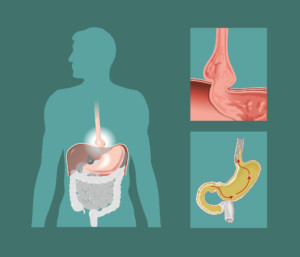Is Hiatal Hernia Causing your Stubborn Symptoms?

Is Hiatal Hernia Causing Your Stubborn Symptoms?
There’s a condition we treat here at the clinic that epitomizes what we do in Root Cause Medical. While it’s rather self-explanatory that “root cause” delves into the reason a health problem gets created, the particular issue I want to share with you today involves some of the most common reasons patients seek help: pain or discomfort plus digestive issues.
Imagine if a single problem could cause all of the following:
- Abdominal pain
- Shortness of breath
- Panic attacks
- Chest pain
- Trouble sleeping
- Digestive distress – including indigestion, pain, and/or bloating
- Lightheadedness
- Dizziness
Is there a single condition responsible for all these problems? In our clinical experience, the answer is a resounding “yes”! What’s unfortunate is that the majority of people suffering from the problem are either given the incorrect treatment or no treatment at all.
Hiatal Hernia is the condition responsible
The problem is called a hiatal hernia. “Hiatus” means hole or opening; a “hernia” is when something is protruding through an opening that shouldn’t. You may have heard of abdominal hernias where someone’s intestines are pushing through an opening or tear in the abdominal muscles.
In the case of a hiatal hernia, the opening is a normal one through which the esophagus passes through an opening in your diaphragm. The only way your mouth is connected to your stomach is via the esophagus, a long tube.
In order for the esophagus to “connect to” the stomach, it passes through an opening in the diaphragm. While the opening for the esophagus is normal, what isn’t normal is when the top of the stomach is pushing through that same opening, enlarging it.
Hiatal Hernia is frequently undiagnosed or misdiagnosed
(Schematic drawing of hiatal hernia)
You can see in the diagram that the stomach should be found below the diaphragm. In a hiatal hernia, the stomach is elevated and pushing up against the diaphragm or, in more severe cases, the top of the stomach itself has stretched wide the opening as it has come up above the level of the diaphragm.
When severe such a hiatal hernia requires surgery to pull the stomach back below the diaphragm and sew up the enlarged opening. What we most often see with patients is a mild scenario, and therein lies the problem. When severe, no one is going to miss the need for surgery (although the outcome is poor), but when the situation is mild, you cannot see it but that doesn’t mean the patient doesn’t feel the effects of it. And those effects can be quite severe and debilitating.
Why do you develop the problem?
One of the key points from a root cause medicine approach is to appreciate why the stomach is pushed up against the diaphragm. The stomach is in spasm and has pushed upward. Why is it in spasm? The answer to that explains why we frequently find a dietary component associated with hiatal hernias.
Not to ask a silly question, but what goes into the stomach? Food, of course. The stomach is designed to digest food, but if it doesn’t like what’s being put into it, it can spasm. Such a spasm can cause it to move upward and push on the diaphragm.
Let’s now look at what the diaphragm does. It’s made up of two dome-shaped muscles that divide your torso in half. Above the diaphragm lies the heart and lungs, while below it lies the digestive organs predominantly.
The diaphragm moves every time you breathe. Take a deep breath – as you do so the diaphragm bows downward, allowing the air to enter. Let the breath out – the diaphragm now bows upward, pushing out the air. Since it controls breathing, it never takes a break.
What happens when your diaphragm doesn’t move correctly?
Now imagine it can’t fully move. It’s almost like someone who is sitting on your chest or subtly putting their hands around your neck, reducing the amount of air you can take in. If you couldn’t freely inhale all the air you wanted your nervous system would notice, you could start feeling a little panicky or get chest pain.
Did you know that if you showed up in an E.R. complaining of chest pain, the major differential diagnosis is to find out if you’re having a heart problem or a hiatal hernia? Yes, it’s that well known that it can cause chest pain.
It’s a problem that is often “treated” with anxiety medications
But if the scan doesn’t show an overt hiatal hernia and they’ve ruled out a heart condition, you’ll be sent home with a pat on the back telling you you’re “fine”. Or, if instead of chest pain your hiatal hernia manifested with a panic attack, you’ll be sent home with anti-anxiety medication. Such medications have very dangerous, life-threatening side effects.
In addition to discovering why the stomach is going into spasm, there are some structural and neurological causes to take into consideration. The nerves that travel to the diaphragm originate in the neck. Someone could have an irritated or pinched nerve in their neck (with or without pain) that is causing the diaphragm to spasm. Also, weak abdominal muscles, a weakened core, can put stress on the diaphragm.
A woman who has had a baby and lost her abdominal tone is also at risk of having a hiatal hernia.
As mentioned earlier, a person who is eating something they are reacting to can cause a hiatal hernia. Realize they may not have indigestion but the cause is still the stomach and what they are eating.
Treatment: How is a Hiatal Hernia fixed?
It is not difficult to treat this condition. We have met so many different patients with so many different symptoms and causes of those symptoms, who, at the root of it, we're all suffering from a hiatal hernia.
- There is a procedure to break the spasm between the stomach and the diaphragm that gives instant relief. It’s fabulous because the patient can feel it right away and it is performed by a doctor of chiropractic. The Drs Petersen have been performing this for decades, but it isn’t taught in school. It was something they learned during their secondary education. But, the cause must be addressed too or the problem will continue to return.
- If there is a stomach spasm due to food intolerance, that food needs to be discovered.
- If constipation exists, its cause must be identified, as the increased abdominal pressure ensuing from constipation and having to bear down can cause the stomach to move upwards.
- If a nerve is irritated, we use chiropractic to remove the irritation from that nerve. It takes some time to gently restore nerve function.
- If the abdominal muscles are in a weakened state, they must be repaired and restored to the proper strength and balance; this requires physical therapy.
Root Cause uses a team to treat this condition
You can see now why the issue with a hiatal hernia is something that epitomizes what we do with Root Cause Medicine. Not only does it require knowing how to diagnose it despite a negative traditional test, but it also requires understanding the various treatment modalities required to truly fix the problem. It may, and frequently does, involve the teamwork of doctors of chiropractic, physical therapy, and nutrition.
Was this of interest? The odds are you likely know someone suffering from this condition. If so, please pass along this blog and let them know we are happy to perform a complimentary consultation to find out if a hiatal hernia is at the root of what’s bothering them.
There is no reason for you or anyone you know to continue suffering needlessly. This problem happens to men, women, and individuals of all ages.
What else would you like to hear about? Please let me know.
Until next time.
Do you need help with your health?
We have the diagnostic and testing tools, the clinical experience, and a different medical approach to discovering the root cause of why you have the symptoms that are bothering you. As long as you are ready to make some dietary and lifestyle changes, we can help you. We will "hold your hand" through the changes, step by step, to make each step an easy one. We are located in Clearwater, FL, at 1000 S Ft Harrison, at the corner of Ft. Harrison Ave. and Magnolia St. There is plenty of parking space directly accessible from Ft Harrison. If it is not convenient for you to come to Root Cause Medical Clinic, we offer telehealth/telemedicine consultations to residents of certain states. Call us for details.
Contact us for a Consultation – Call 727-335-0400

Dr. Vikki Petersen DC. CCN
Founder of Root Cause Medical Clinic
Certified Functional Medicine Practitioner
Dr Vikki Petersen is a public speaker, author of two books, several eBooks and creates cutting edge content for her YouTube community. Dr Vikki is committed to bringing Root Cause Medicine and its unique approach to restoring health naturally to the world.
Ask a Doctor
Have a health concern you'd like to speak with a doctor about? Or just want clarity on a subject? Ask Us!



